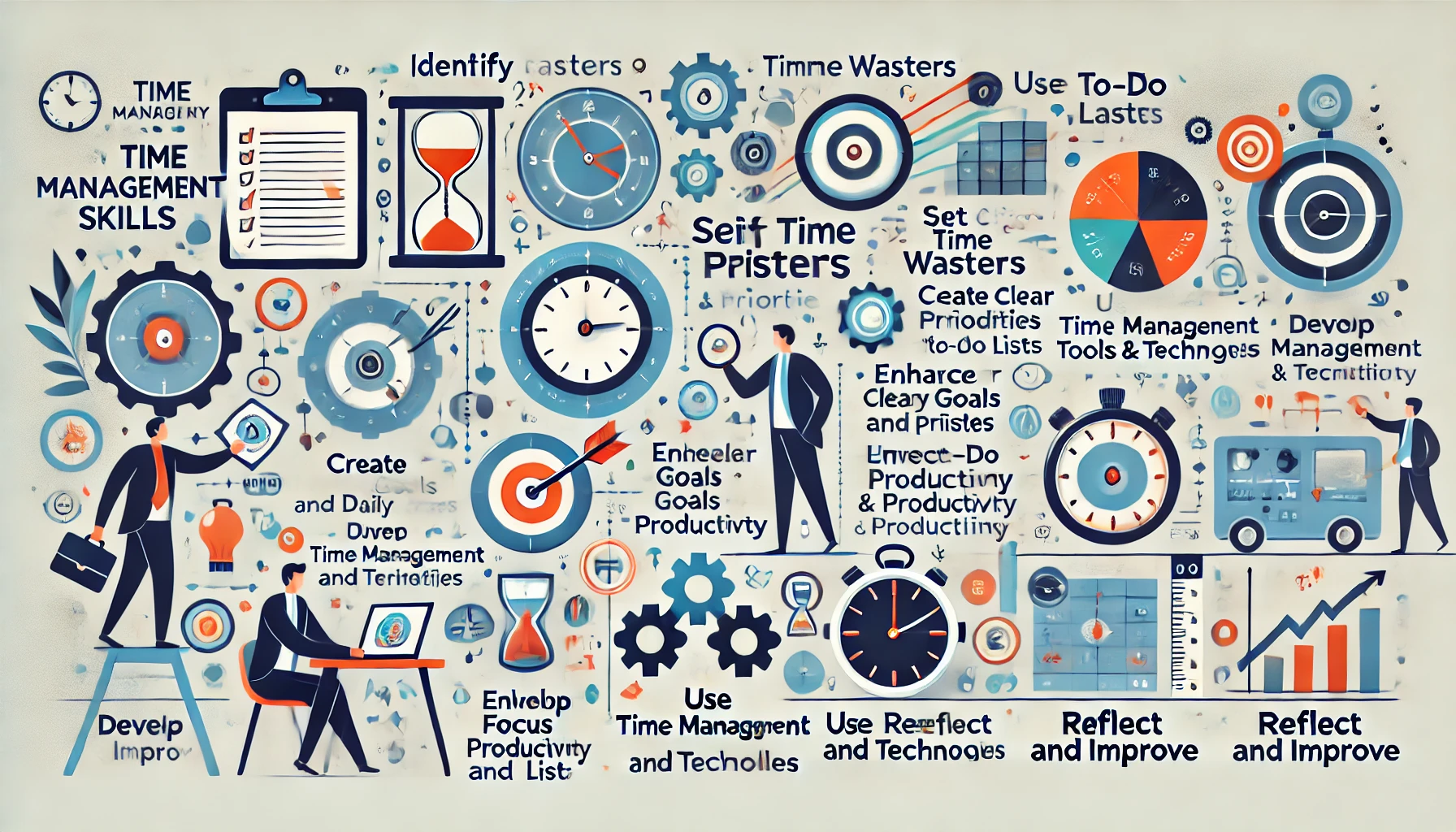Mastering the Essential Skill of Time Allocation
The ability to manage one’s time efficiently is pivotal for the attainment of both personal and career objectives. This necessitates meticulous planning, organization, and regulation of time usage to augment efficacy and output. This skill is beneficial across various walks of life, from academic pursuits to professional endeavors and even in domestic management. Enhancing your time allocation skills can lead to achieving greater milestones in shorter spans and alleviating stress levels. This document will furnish you with actionable tactics to refine your time allocation competencies.
- Recognize Your Time Allocation Obstacles
Spot the Time Drains To begin refining your time management, pinpoint the activities that sap your time. Predominant time sinks include:
- Procrastination: Postponing essential tasks.
- Multitasking: Simultaneously juggling numerous tasks can lead to diminished output.
- Distractions: Interruptions can come from calls, emails, social platforms, or peers.
- Inadequate preparation: A lack of definitive priorities and timetables.
Evaluate Your Present Practices Allocate a week to note down your engagements and the duration each consumes. This will offer insight into your time expenditure and spotlight potential improvement zones.
- Establish Explicit Objectives and Prioritizations
Articulate Your Aims Definite and precise objectives keep you concentrated and driven. Apply the SMART framework to craft your objectives:
- Specific: Articulate your ambitions distinctly.
- Measurable: Your aim should be quantifiable.
- Achievable: Your objectives should be attainable given your resources.
- Relevant: Your aims should dovetail with your overarching aspirations.
- Time-bound: Assign a timeframe for your objective’s completion.
Sort Tasks by Importance Employ the Eisenhower Matrix to sort tasks by urgency and significance:
- Urgent and significant: Tackle these tasks forthwith.
- Significant yet not urgent: Plan these tasks for a later time.
- Urgent but not significant: If feasible, pass these tasks to others.
- Neither urgent nor significant: Reduce or discard these tasks.
- Structure and Arrange Your Time
Craft a Daily Agenda Organize your day by delineating a schedule. Segment your day into periods devoted to particular duties. Utilize instruments like agendas, calendars, or time management applications for better organization.
Draft To-Do Lists Compose a daily list of tasks to monitor your responsibilities. Arrange the items by urgency and importance. Revisit and adjust your list as needed.
Impose Time Restrictions Set definitive time ceilings for tasks to avert undue time consumption. Employ methods like the Pomodoro Technique, which encompasses 25 minutes of work followed by a 5-minute respite.
- Amplify Focus and Output
Minimize Disturbances Identify and diminish distractions in your setting. This could mean:
- Muting alerts: Silence electronic devices and disable inessential notifications.
- Establishing a dedicated work zone: Prepare a tranquil, organized space for labor or study.
- Demarcating boundaries: Notify others of your intense focus periods to prevent interruptions.
Advocate Single-Tasking Concentrate on executing a single task at a time as opposed to multitasking. This is conducive to better concentration and efficiency.
Incorporate Breaks Frequent respites are vital to sustain output and avert fatigue. Utilize intermissions to unwind, stretch, or ambulate.
- Deploy Time Allocation Instruments and Methods
Time Allocation Apparatuses A plethora of tools exists to assist in effective time management, such as:
- Calendars: Digital or analog calendars for scheduling.
- Task management software: Tools like Trello, Asana, or Todoist for task organization and progress tracking.
- Time tracking applications: Solutions like Toggl or Clockify to monitor activity durations.
Time Allocation Techniques Embed established time management methods into your daily regimen:
- Pomodoro Technique: Work for set intervals, then break.
- Time blocking: Dedicate specific periods to various tasks or activities.
- Batching: Consolidate akin tasks and execute them collectively to conserve time and minimize context shifts.
- Cultivate Healthy Routines
Secure Ample Rest Sufficient sleep is indispensable for sustained concentration, vitality, and productivity. Target 7-9 hours nightly.
Engage in Regular Physical Activity Consistent exercise elevates energy and augments concentration and cognitive lucidity.
Sustain a Nutritious Diet A well-rounded diet furnishes essential nutrients for sustained energy throughout your day.
- Assess and Refine
Gauge Your Headway Periodically appraise your time management prowess and discern areas ripe for enhancement. Adjust your approach accordingly.
Request Appraisals Solicit opinions from associates, mentors, or friends on optimizing your time management skills.
Stay Adaptable Be ready to amend your plans as circumstances warrant. Adaptability is key when navigating unforeseen events or priority shifts.
Commit to Ongoing Education Remain receptive to fresh time management strategies and practices. Engage with literature, participate in seminars, or enroll in digital courses to persistently refine your abilities.
In Summation The journey to time management mastery demands steady dedication and application. By delineating clear targets, arranging tasks by priority, structuring your schedule, and employing effective tools and methodologies, you can amplify your productivity and attain an equilibrium between work and personal life. Regularly review your progress and remain agile in your tactics. With commitment and tenacity, the art of time management can be conquered, propelling you towards your personal and career benchmarks.
